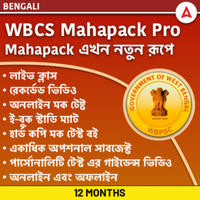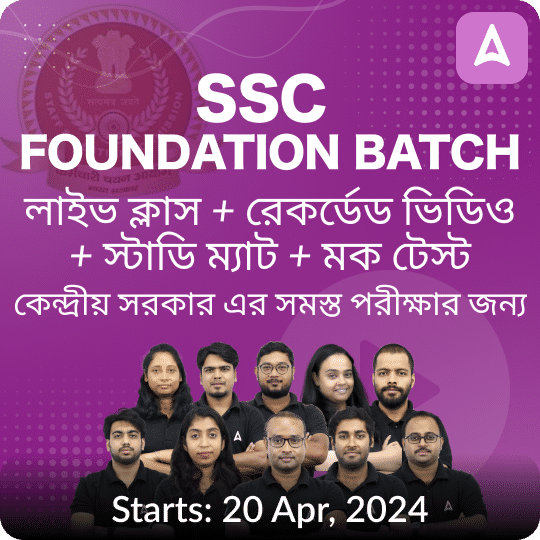Table of Contents
History MCQ in Bengali: Welcome to Adda 247. ADDA 247 Bengali is giving you History MCQ in Bengali for all competitive exams including WBP Lady Constable. Here you get ten Multiple Choice Questions and Answers with Solutions every day. Here you will find all the important questions and answers that will help you increase your knowledge and move you towards fulfilling your goals. Study these History MCQs regularly and succeed in the exams.
| History MCQ in Bengali | |
| Topic | History MCQ |
| Category | Daily Quiz |
| Used for | WBP Lady Constable Exam |
History MCQ
Q1. কোন সনদ আইনের মাধ্যমে চীনের সাথে ইস্ট ইন্ডিয়া কোম্পানির একচেটিয়া বাণিজ্যের অবসান ঘটে?
(a) সনদ আইন 1793
(b) সনদ আইন 1813
(c) সনদ আইন 1833
(d) সনদ আইন 1855
Q2. আন্দামান সেলুলার জেলের দেয়ালে ভারতের ইতিহাস রচনাকারী জাতীয় নেতা কে ছিলেন?
(a) নন্দলাল বসু
(b) আম্বেদকর
(c) বীর সাভারকর
(d) জ্যোতিবা ফুলে
Q3. হর্ষের পরিচায়ক রাজধানী কোথায় ছিল?
(a) প্রয়াগ
(b) কনোজ
(c) থানেশ্বর
(d) মথুরা
Q4. কোনটি মন্দির স্থাপত্যের দ্রাবিড় শৈলীর প্রতিনিধি?
(a) বিমান
(b) শিখরা
(c) মণ্ডপ
(d) গোপুরম
Q5. স্বামী দয়ানন্দ সরস্বতীর আসল নাম কি ছিল?
(a) অভি শঙ্কর
(b) গৌরী শঙ্কর
(c) দয়া শঙ্কর
(d) মূল শঙ্কর
Q6. বাংলায় চিরস্থায়ী রাজস্ব বন্দোবস্ত প্রবর্তন করেন কে?
(a) ক্লাইভ
(b) হেস্টিংস
(c) ওয়েলেসলি
(d) কর্নওয়ালিস.
Q7. চোখের প্রতিটি অশ্রু মোছাকে কে তার চূড়ান্ত লক্ষ্য বলে ঘোষণা করেছিলেন?
(a) জওহরলাল নেহেরু
(b) গান্ধী
(c) সর্দার প্যাটেল
(d) বাল গঙ্গাধর তিলক
Q8. সঠিক কোন কালানুক্রমিক ক্রমে ব্রিটিশরা নীচে উল্লিখিত স্থানে তাদের বাণিজ্য কেন্দ্র স্থাপন করেছিল?
(a) কলকাতা, বোম্বে, মাদ্রাজ এবং সুরত
(b) বোম্বে, মাদ্রাজ, সুরাট এবং কলকাতা
(c) সুরাট, মাদ্রাজ, বোম্বে, কলকাতা
(d) সুরত, মাদ্রাজ কলকাতা, বোম্বে
Q9. 19 শতকে সত্যশোধক সমাজের প্রতিষ্ঠাতা কে ছিলেন?
(a) স্বামী বিবেকানন্দ
(b) বি আর আম্বেদকর
(c) জ্যোতিবা ফুলে
(d) ঈশ্বরচন্দ্র বিদ্যাসাগর
Q10 . দাস রাজবংশের প্রথম শাসক কে ছিলেন?
(a) কুতুবুদ্দিন আইবক
(b) ইলতুৎমিশ
(c) সুলতান মাহমুদ
(d) বলবন
History MCQ Solution
S1. (b)
Sol.
- By the Charter Act of 1813 the trade monopoly of East india company comes to an end.
- But the monopoly on the tea trade with China was unchanged.
S2. (C)
Sol.
- Vir Savarkar was great national leader , he wrote history of India on walls of Andaman cellular Jail.
S3.(c)
Sol.
- The introductory capital of the Harsha was the Thaneshwar.
- It was destroyed during an attack by Bhaktiyar dynasty of Delhi sultanate.
S4. (a)
Sol.
- Vimana is like a stepped pyramid, is representative of the Dravida style of the temple architecture.
S5. (d)
Sol.
- Mula shankar was the original name of the swami dayanand saraswati.
- He established Arya samaj society.
- He gave a slogan go back to the Vedas.
S6. (d)
Sol.
- The permanent settlement was introduced by lord Cornwallis in 1793.
- According to this settlement landlords agreed to have perpetual and hereditary rights over the land.
S7.(a)
Sol.
- JawaharLalNehru in his speech freedom at midnight said that the ambition of the greatest men of our generation has been to wipe every tear from every eye.
S8. (d)
Sol.
- Britishers established their first trading center in Surat.
- After that in Madras, Calcutta, and Bombay.
S9.Ans.(c)
Sol.
- Mahatma Jyotiba Phule was born on 11 April 1827 in Katgun, Satara District in Maharashtra Mahatma Phule founded the Satyashodhak Samaj on 24 September 1873.
- He opposed caste system and idolatry. Gulamgiri and Sarvajanik Satya Dharma are prominent book written by him.
S10.Ans.(a)
Sol.
- Qutubuddin Aibak was bought by Muhammad Ghori who later made him his Governor.
- After the death of Ghori, Aibak took up sovereign powers on 24th June 1206 founding the Slave Dynasty in India. Shams ud-din Iltutmish was the third ruler of the Delhi Sultanate.










